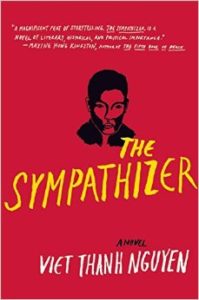 The Doctor’s Book Club
The Doctor’s Book Club
Viet Thanh Nguyen The Sympathizer
The thought, when written down, becomes less oppressive, but some thoughts are like a cancerous tumor: you express is, you excise it, and it grows back worse than before
-Vladimir Nabokov, Invitation to a Beheading
In many fictional Anglican accounts of the Vietnam War, the chaos of the fall of Saigon serves as the dramatic conclusion to an America-centric saga. But in Viet Thanh Nguyen’s Pulitzer Prize winning debut novel The Sympathizer, the final days before the arrival of the communist army serve instead as the launching point for a tragicomic and, at times, absurdist exploration of Vietnamese identity both on a personal and a national level.
The novel is structured as a forced confession of an unnamed narrator, composed in a north Vietnamese reeducation camp long after the war has ended. Known simply as Captain, the protagonist devotes the bulk of his story to explaining the complex nature of his identity. From the opening lines of the novel, we learn that he is a man of opposing alliances, “a spy, a sleeper, a spook, a man of two faces . . . a man of two minds.” A product of a French Catholic priest’s violation of an underage Vietnamese girl, Captain is a trusted member of the CIA affiliated south Vietnamese secret police and a communist spy.
As he explains, this conflicting identity, which enables him “to see any issue from both sides,” makes him perfectly suited for work as a spy. Having been betrayed himself in turn by Catholics, communists, revolutionaries, and Americans, he feels justified in reciprocating the betrayal. But his fractured sense of self also turns him into the ultimate sympathizer—a man who cannot help but feel the weight of each side’s atrocities on his shoulders.
After fleeing Vietnam in the evacuation of Saigon, Captain begins living as a refugee in southern California, where he observes former Vietnamese war heroes succumb to the humiliation of immigration, downward mobility, and newfound uselessness. America, like Vietnam, reveals itself as a place full of outsiders.
Ultimately, Captain elects to join a counterrevolutionary mission, which swiftly ends with an ambush and his imprisonment in a reeducation camp. The camp’s torture appears endless; however, it paradoxically allows Captain to find inner peace in the realization that all people are united in a similar struggle. This understanding arises from a piece of advice given to him by a doctor from his past: that “the best medical treatment is a sense of relativism.” Indeed, Captain comes to see that pain and suffering are ubiquitous; and therefore “we cannot be alone! Thousands more must be staring into darkness like us . . . We lie in wait for the right moment and the just cause, which, at this moment, is simply wanting to live.” The recognition of this collective plight brings him closer to the rest of humanity, which he had never previously felt a connection to.
The Sympathizer illustrates the complexities of past experience and the circuitous roads and roadblocks that can define a life. But it also serves as a reminder that each journey is inevitably defined by hardship: that despite our apparent differences, we share the universality of suffering.
The need to recognize this commonality is particularly important in medicine, in which the experiential divide between patient and doctor may seem insurmountable. Already delicate, the relationship is often complicated by a sick patient’s feeling that their healthy physician lacks the ability to relate to their struggle. But, as Susan Sontag notes, “Everyone who is born holds dual citizenship, in the kingdom of the well and in the kingdom of the sick.” To be alive is to balance the reality of these two identities.
For doctors and patients there is, therefore, great value in remembering that illness and trauma touches everyone’s lives. Like Captain, we may all feel as though we lack common ground and an ability to understand each other’s plights. But in the kingdom of the sick, we are forever reminded of how similar we truly are.
Next Month:
We will discuss Ben Winters’s Underground Airlines.
Questions to consider:
-How can a protagonist’s personal identity affect the power of a story? How can an author’s?
-What are the ways that a patient’s identity can affect their medical care?
-In Underground Airlines, Victor remarks that “Freedman Town serves a good purpose—not for the people who live there, Lord knows; people stuck there by poverty, by prejudice, by laws that keep them from moving or working. Freedman Town’s purpose is for the rest of the world. The world that sits, like Martha, with dark glasses on, staring from a distance, scared but safe. Create a pen like that, give people no choice but to live like animals, and then people get to point at them and say ‘Will you look at those animals? That’s what kind of people those people are.’” In what way can we see this similar tendency in healthcare through the perpetuation of narratives of personal responsibility in disease?
 Claire McDaniel is a third year medical student at Georgetown University School of Medicine in Washington, DC, participating in the school’s Literature and Medicine Track. Additionally, she is an MBA candidate at Georgetown University McDonough School of Business.
Claire McDaniel is a third year medical student at Georgetown University School of Medicine in Washington, DC, participating in the school’s Literature and Medicine Track. Additionally, she is an MBA candidate at Georgetown University McDonough School of Business.
 Daniel Marchalik is a urologist at MedStar Washington Hospital Center in Washington, DC. He directs the Literature and Medicine Track at the Georgetown University School of Medicine and writes a monthly column for the Lancet.
Daniel Marchalik is a urologist at MedStar Washington Hospital Center in Washington, DC. He directs the Literature and Medicine Track at the Georgetown University School of Medicine and writes a monthly column for the Lancet.
